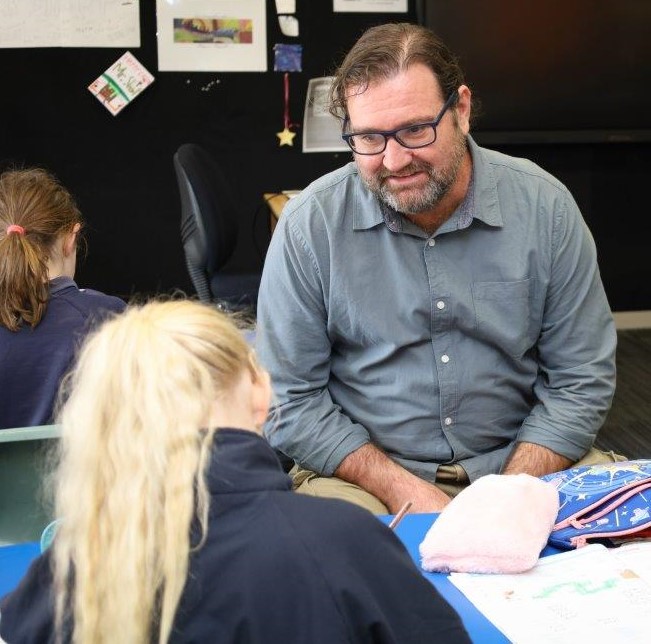Latest News

Justin Short is Primary Learning Enrichment Coordinator at Lumen Christi Catholic College, Pambula Beach. In 2016 he became certified as a Lead Teacher in the Highly Accomplished and Lead Teacher (HALT) program.
HALT is a national initiative of the Australian Institute for Teaching and School Leadership. It’s a voluntary process where individual teachers demonstrate that they meet the highest Australian Teacher Standards.
A spokesperson for the NSW Education Standards Authority, the state’s HALT certifying body, says, ‘HALTs are highly effective practitioners whose expertise has been recognised through a rigorous national process.’
The ACT has the highest proportion of HALTs in Australia and Catholic Education Canberra Goulburn (CECG) places a high priority on supporting the certification of Highly Accomplished and Lead teachers across our schools in the ACT and NSW.
‘You get to look at the measurable impact you have’
Justin applied for HALT while working at a public primary school in Katherine in the Northern Territory. ‘The Principal there said, ‘You’re working already as a lead teacher; we need to get you accredited.’
Why is it important for teachers to aim for HALT certification?
‘One of the best things that I got out of it is a self-awareness of how you teach and why you do what you do,’ Justin says. ‘You get to really break that down and look at the measurable impact you have. And at Lead Teacher level you’re looking at how it impacts your colleagues, the school and the community you work in.’
‘It breaks it down to a really small level that you zoom back from and then go, “Oh wow—that’s what I do.”’
And how would a teacher know that they were ready for HALT?
‘A lot of them are well on the way already,’ he says. ‘There are so many great teachers. What you’re doing is certifying that your practice is at that level.’
‘Teaching the spiritual part of the child is really important as well’
Justin had a non-traditional path into teaching, having previously worked in farming, horticulture, tourism and social services. His teaching experience has also been wide ranging:
‘I’ve worked in remote communities, I’ve worked in large public schools. I’ve worked in between. What I like about the Catholic system is the whole framework. We teach the whole child. Yes, that happens in other systems too, but we’re not just teaching the moral and the social—I think teaching the spiritual part of the child is really important as well.’
‘The kids we teach who aren’t Catholic still get a really great sense that there is this spiritual side to life and this spiritual wonder. That’s a great thing to have and it’s something that you should nurture and develop and celebrate as a really big part of who you are.’
‘We’re not holding anyone back but we’re making sure that everybody comes’
Before his current role, Justin was a coordinator and teacher of project-based learning in the senior school at Lumen Christi. His return to primary teaching coincided with CECG adopting Catalyst— a program of professional development for teachers based on the science of learning.
‘It seemed like a really great time to get back into the primary space when there were some new processes coming in, some really good curriculum structures to get our teeth into.’
Catalyst focuses strongly on teaching reading by explicit instruction:
‘With Catalyst, we’re doing that really systematically. We’re taking really great research-based strategies. We’re training everyone really well in how to use them, and we’re implementing them school wide. It becomes really structured and clear to the students about what they’re doing and why. It becomes predictable for them and it becomes a space where we put our expectations as high as we can. All of these children will reach these goals. We’re not holding anyone back but we’re making sure that everybody comes.’
As Justin says, ‘We access knowledge for all the new technologies and things through our ability to read and to comprehend and to read critically. That’s how kids learn the world and have the opportunity to access the world.’
Lumen Christi is also implementing a low-variance maths curriculum using the same type of approach.
‘There are things in my toolkit that I have to put away’
The compelling evidence in favour of Catalyst has changed the way Justin thinks about teaching.
He explains, ‘We’re looking at the neuroscience of how and why people learn, and we’re focusing on things that we know have a measurable impact. We know it’s what works. The science tells us it works; the data tells us it works. Let’s get it happening and let’s do it consistently.’
‘That means for me, as a Lead Teacher who’s very innovative, there are things in my toolkit that I have to put away because what’s best for the kids is that we take an approach that we know is going to work and that everyone can implement with the training.’
